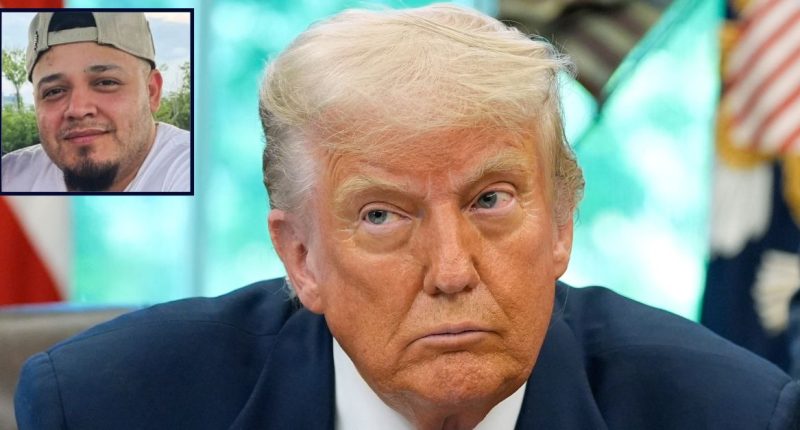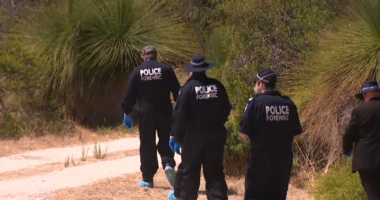Share this @internewscast.com
Main: President Donald Trump addresses the media while signing executive actions in the Oval Office at the White House, Monday, May 5, 2025, in Washington (AP Photo/Alex Brandon). Inset: An updated photograph of Kilmar Abrego Garcia (CASA).
Lawyers for Kilmar Abrego Garcia, who was deported to El Salvador despite having protected status, are alleging that the Trump administration is defying a federal judge and the U.S. Supreme Court by not providing any information about efforts made to “facilitate” his return to the U.S.
In an eight-page motion submitted on Wednesday, the attorneys requested that U.S. District Judge Paula Xinis allow them to depose officials from the Departments of State, Justice, and Homeland Security. They seek details concerning Abrego Garcia’s incarceration, actions taken to enable his release, and any further steps the administration intends to pursue. Additionally, the document suggests that a White House representative may need to testify under oath if these discussions yield no results.
According to Abrego Garcia’s attorneys, the depositions are necessary in light of the administration’s “uniform refusal to disclose ‘what it can’ regarding their facilitation of Abrego Garcia’s release and return to the status quo ante.” The Supreme Court last month ordered the administration to “share what it can” concerning what has been done for Abrego Garcia as well as “the prospect of further steps.”
Love true crime? Sign up for our newsletter, The Law&Crime Docket, to get the latest real-life crime stories delivered right to your inbox.
Three of the four government officials who have provided sworn statements to the court have already been deposed, but attorneys for Abrego Garcia said that they are “still in the dark about the Government’s efforts to facilitate Abrego Garcia’s release from custody and return to the United
States.”
The 29-year-old Abrego Garcia was living in the U.S. with protected legal status when he was taken into custody by federal agents and whisked away to a Salvadoran prison known as CECOT, or the Terrorism Confinement Center due to an “administrative error” on March 15, 2025. Xinis directed the government to facilitate his return — an order that was subsequently upheld by the Supreme Court — and has required the government to provide the court with daily updates about its progress, though little relevant information has been revealed.
To avoid being stonewalled during the proposed depositions, Abrego Garcia’s attorneys requested an organizational deposition, which would place the burden on each of the aforementioned departments to designate a representative and prepare that individual with the information known about the subject of the deposition.
The attorneys also indicated that they may need to take the deposition of someone from directly from the White House.
“[A]s seems apparent from its public statements, this case also involves decision-making at the White House in addition to the three Departments,” the filing states. “Accordingly, depending on the testimony obtained in any authorized Department depositions, Plaintiffs may need to seek additional testimony from an appropriately knowledgeable representative of the White House.”
Abrego Garcia’s attorneys asked that Xinis schedule the organizational depositions after she issues any ruling on the government’s recent invocation of the state secrets privilege. The privilege permits the government to withhold certain evidence based on a “reasonable danger” that disclosure would expose military matters in a manner adverse to national security interests.
Xinis has demanded that “simultaneous briefs” be submitted to address the “legal and factual bases for the invocation of those privileges,” and scheduled an in-person hearing for May 16 to address “solely the matters raised” about the state secrets and deliberative process privileges.
















